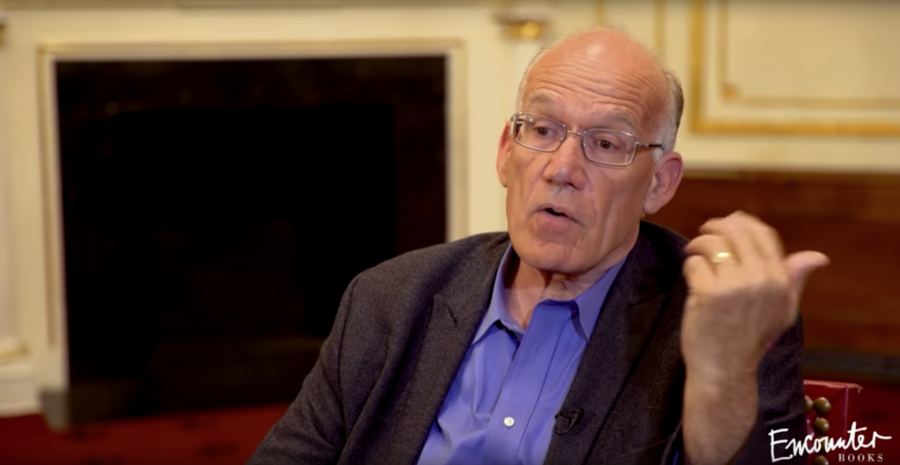Check out my Encounter Books Podcast interview with the always provocative Lord Conrad Black on the history of American populism and President Donald Trump’s place in it, an assessment of Trump’s populist political agenda, the poisonous legacy of Watergate, The Resistance, the 2018 midterm elections and much more.
I thought the below exchange towards the end of our conversation was particularly compelling:
Ben Weingarten: The ultimate goal of the litany of charges against the President, as we all know, but which is left unsaid frequently, is to, as you said, undermine his legitimacy, and ultimately, from the Democratic perspective, to try to remove him from office — to create, kind of build the case, real or imagined, and then be able to apply high crimes and misdemeanors, and seek to impeach him. All of the signs look fairly ominous for what will happen at the very least in the House, in the midterm elections, for the Republican Party. What do you anticipate happening if Republicans do, in fact, lose the House?
Lord Conrad Black: Well, I agree. I think they’re trying to either remove him…First of all, sort of taint him and plant this generalized view that there’s something illegitimate about him, and therefore, he shouldn’t receive the respect normally offered to a [president]…Secondly, if they can’t push him out altogether, to distract him so much that he can’t perform properly, so they can then accuse him of being a do-nothing president and a mere controversialist, and have him as a sort of…immobilized president sitting in the White House, awaiting the end of his term.
On your specific question, if the Democrats got control of the House of Representatives, certainly there would be a much greater danger that they would try and put an impeachment bill through. I doubt that…On anything we can see at this point, there would be no really serious reason to do it, other than their own partisanship. And there are some sane people in that party and in their House of Representatives delegation. I think Trump would have to do something that the media could successfully represent as really seriously outrageous before they could get a positive vote. I don’t think they…unless Trump actually committed a crime, which he’s not going to do, has not done and will not do, but unless he did that, they would have less chance of actually getting a vote to remove him in the Senate, a two-thirds vote, than the Republicans had when they tried it with Clinton.
So I think the price we paid essentially for the terrible overreaction to Watergate, accompanied by the fact that Mr. Nixon didn’t handle the investigation properly — I don’t think there is any evidence even now that Nixon himself committed illegalities in Watergate, but some people in his entourage did — but the price we paid for that is the routinization of the criminalization of policy differences. “I don’t agree with this person. We’re imaginative and adaptive Americans. Let’s see if we can avoid this policy option we don’t like, and as a bonus, get rid of this President we don’t like ’cause he’s in the other party” — like accusing him of crimes, as if it was just a confidence vote in a parliamentary system like Britain or Canada. And that is not what the authors of the Constitution intended.
Mr. Nixon was a patriotic man who, in fact, was convinced himself that he did not commit crimes; and if he was judged fairly, would be judged not to have committed crimes. But as a patriot, since impeachment had not been mentioned in the presidential context for over a century, for a president, he just didn’t want to put the country to such a demeaning process. And Bill Clinton had no such reservations, but he did achieve something by showing that it wasn’t a process that would necessarily be very successful. They had not even got that far with Reagan and the Iran-Contra nonsense.
But what should happen at some point soon is both parties, and the powers that be politically in the country generally, should realize that impeachment of a president is something that should be regarded as an absolutely extreme measure, as it was intended to be, in the case of utterly profoundly unconstitutional conduct. It was really designed to prevent a domestic George III coming in. Not that he was that bad a king either, but…he wasn’t. He wasn’t that good either. And he was mad half the time, but he was not a madman…I mean, a mad despot, an autocrat, as he was accused of being. But again, that’s beside the point.
But if the United States — and Alan Dershowitz speaks very well about this, he’s a liberal Democrat who supported Clinton — if the U.S. is going to criminalize in an accelerated and unjust way, or purport to criminalize the conduct of people who are just doing what they said they would do when they ran for election, and then psychiatrize them too, and claim that they’re mentally unbalanced and so forth, you’re going to get chaos in the country. The whole system will break down.
What should happen as a result of all this talk is, have an all-party, nonpartisan resolution and agreement, not legislation, but just a state of mind that is agreed upon, that discussion of the impeachment or removal from office of a president should only be entertained in the event of high crimes and misdemeanors on which there’s real evidence, and not in a routine and frivolous and dangerously irresponsible way, which is what we’ve got now.
[Additionally] I don’t think the Democrats will win the House. I think what will happen is that the President will carefully assemble his healthcare reform that the Republican Party is pretty much agreed upon, and an immigration reform that it’s pretty much agreed upon, put those out very firmly to the voters, stand on his high economic growth and continuing excellent economic numbers, and order the release by the Justice Department, relatively close to the midterm elections, of everything to do with the collusion investigation, to reveal in its ghastly infirmity the absolute vacuity of that argument, the falsity, the malice and the defamatory destructiveness of the entire argument that he or anyone closely associated with him ever colluded with a foreign power to rig an American election. Just administer a bone-crushing defeat to the Democrats, and their echo chamber in the national media. And do it right…just coming into the midterm election campaign. And I think he will gain seats in both the House and the Senate.





